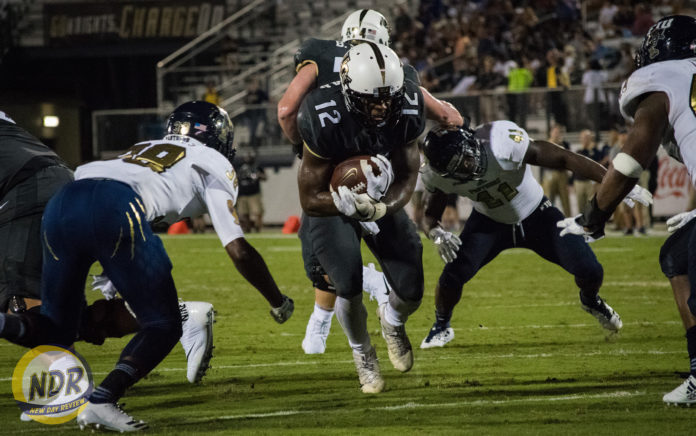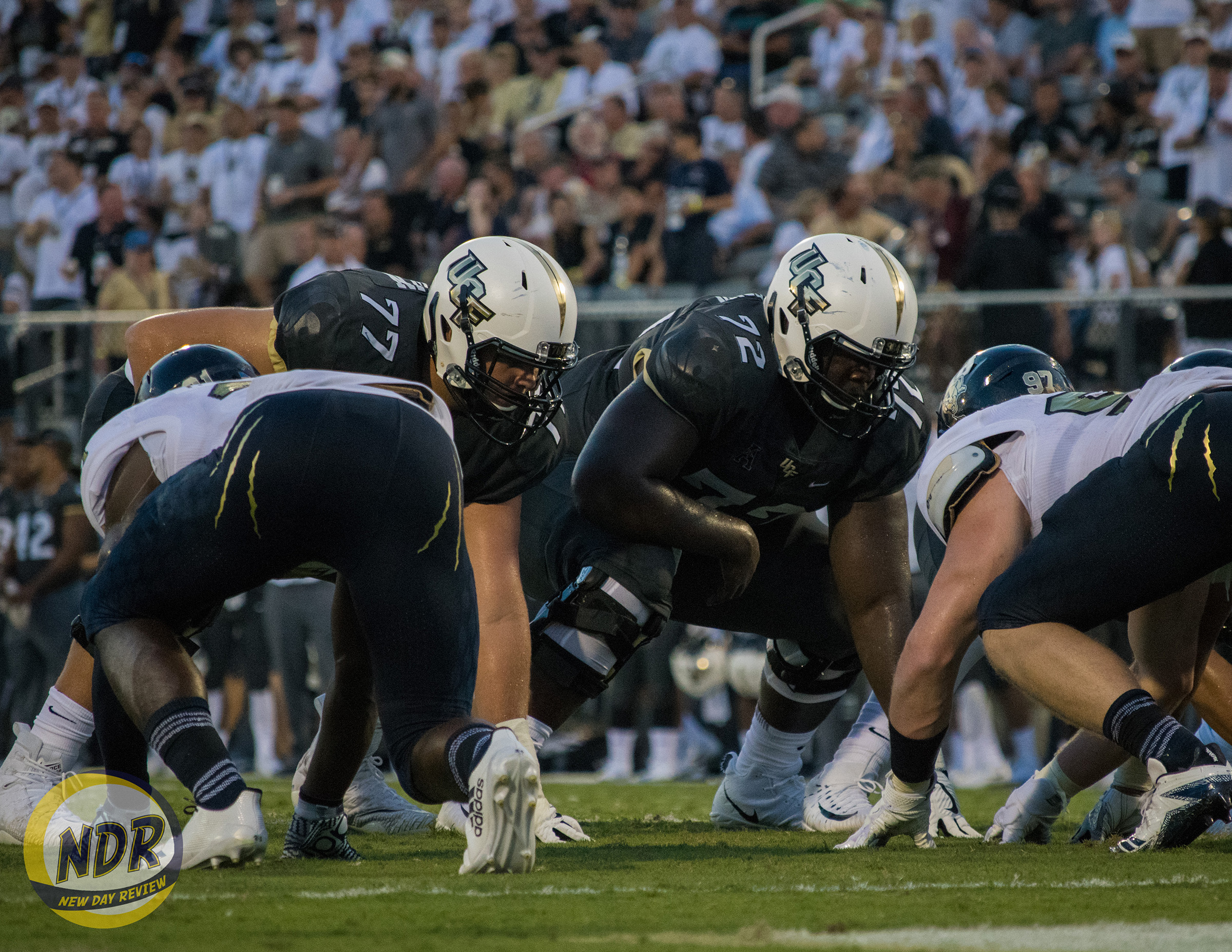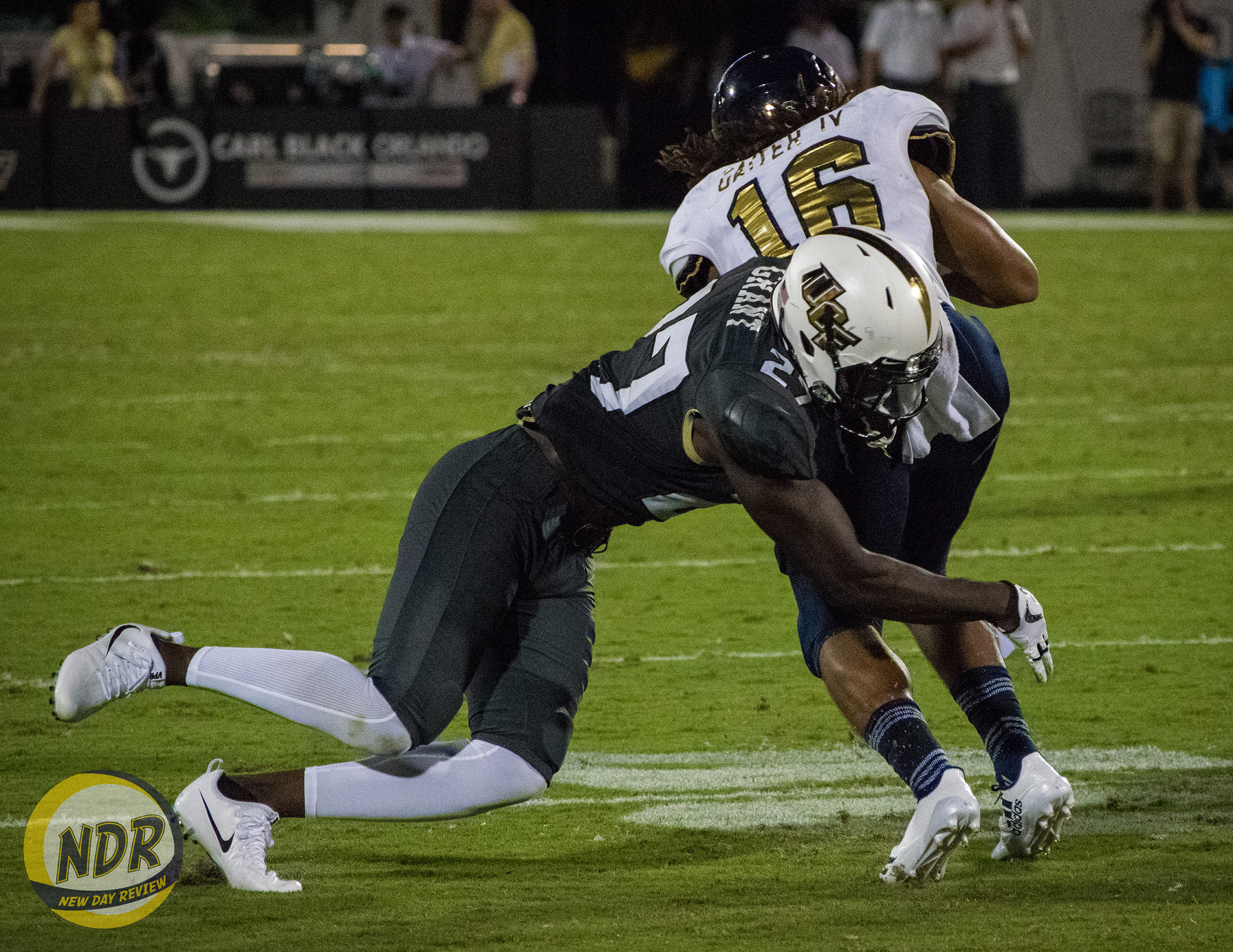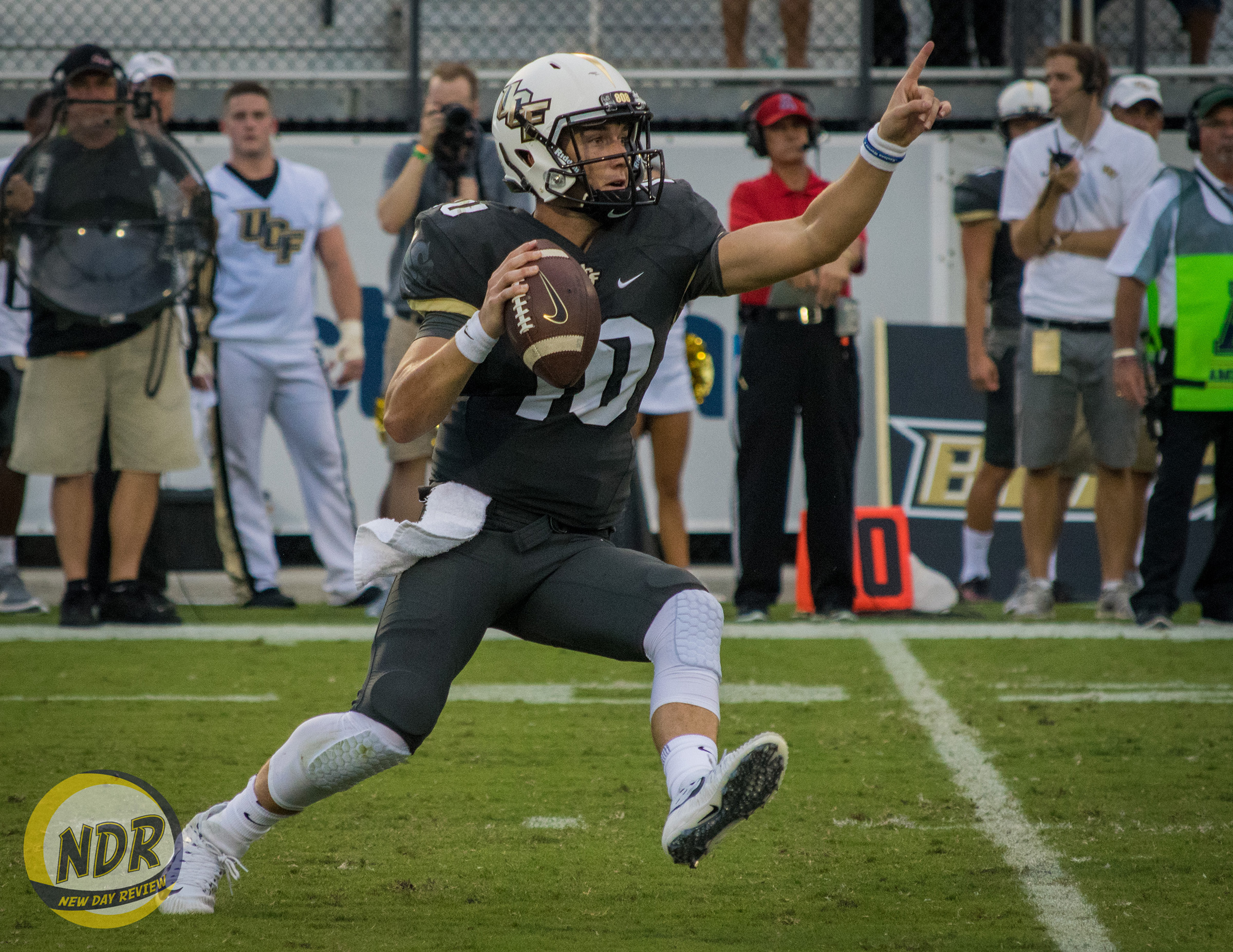
(Photo by Adrian J. Hernandez / New Day Review)
ORLANDO, Fla. – Walking into the locker room at halftime of the University of Central Florida’s season-opener, Knights head coach Scott Frost had to be happy. His offense had just scored 40 points in the first half against Florida International University, as the Knights would roll to a 61-17 win. In Frost’s first season in 2016, the Knights scored 40-plus points in just two games, let alone first halves. And while FIU isn’t a world-beater, the season-opener should make fans optimistic about Frost’s second season. That was the kind of performance fans were expecting when Frost first arrived in Orlando.
When Frost officially took the head-coaching job at UCF in early December 2015, the expectation was that the team would be led by the same type of high-powered and frenetic offense that he managed at the University of Oregon as offensive coordinator. However, that was not the case last season. While Frost did lead the team to a 6-7 record, a six-win improvement from 2015, and a bowl-game appearance, the team was led by the defense.

In 2016, UCF allowed 370.3 yards per game, good enough for 39th in the country. While barely being a top-40 defense might not sound that impressive, it’s important to consider the kind of offenses UCF faced. Of the 38 teams ahead of the Knights, not one faced more than 73.1 plays per game last season, and only eight teams’ defenses played at least 70 plays per game. UCF endured 77.5 plays per game in 2016.
But the stalwart Knights defense managed because of a host of defensive stars. Behind current Seattle Seahawks cornerback Shaquill Griffin’s four interceptions and D.J. Killings’ three, the Knights generated two turnovers per game last season, snatching at least one interception per game for 15 total picks. To put that in perspective, consider these teams’ interception totals: University of Washington, 18; University of Alabama, 16; University of Michigan, 15; Louisiana State University, 9; University of Auburn, 11. Those teams either played in the College Football Playoff or one of the six New Year’s Day bowls.
Interior play was also a factor for the Knights, as linebacker Shaquem Griffin tallied a conference-high 11.5 sacks in an American Athletic Conference Defensive Player of the Year season.
But with Shaquem returning and the Knights confident in their defense, the onus falls on the offense to change the fortune of UCF football.

From 2013 to 2015 as the Ducks’ offensive coordinator and quarterbacks coach, Frost’s offenses were ranked second, third and fifth in yards per game in 2013, 2014 and 2015, respectively. In each of those same seasons, the Ducks ranked third, fourth and fifth in scoring. Frost even helped produce 2014 Heisman Trophy winner Marcus Mariota.
Under Frost, the Knights adopted the new tagline “UCFast” to describe their style of play. UCF’s offense was going to be a fast, wide-open attack, the likes of which fans had never seen before—and, to a certain degree, it was.
The Knights ran an average of 75.0 plays per game, good enough for 30th in the nation and just a notch under the 75.2 plays per game Oregon ran while Frost was at the helm. In the previous three seasons without Frost, the Knights ran just 68.3 plays per game. A difference of seven plays might not seem significant, but that can be the difference between another scoring drive and not. Last season, the Knights scored in an average of 6.7 plays per scoring drive.
UCF’s Frost-led offense also averaged more yards per game than the 2015 Knights. But that wasn’t a difficult feat to accomplish, as the 2015 squad ranked last out of 128 teams with an average of 268.4 yards per game. Frost’s offense, however, didn’t yield significantly greater results, as he bumped the 2016 Knights to 113th in the nation last year. That’s a far cry from Oregon’s 550.1 yards per game in the three seasons Frost was offensive coordinator.
Of course, there are a lot of factors that go into that disparity. UCF was mentally recovering from a winless season with a relatively young team, and Oregon has been a perennial national-title contender for nearly a decade. Asking this Knights team to replicate Frost’s offenses from Oregon in his first year would be absurd.
But, first, for UCF’s offense to resemble anything like the Oregon offenses of old, the Knights need one position to take charge. In Oregon, Frost had Mariota, who starts for the Tennessee Titans, and Canadian Football League quarterback Vernon Adams Jr. UCF needs their own quarterback, McKenzie Milton, to improve.
Last year, UCF burned Milton’s redshirt and threw the Kapolei, Hawaii, native into the fire. Milton got his first start in a 30-24, double-overtime loss to the University of Maryland. He would go on to finish the season with 1,983 passing yards and 10 touchdowns in 10 games.
Milton’s quarterback rating—a calculation of stats including completions, attempts, yards, touchdowns and interceptions—did not make those numbers look any better. He ranked 98th out of 103 qualified quarterbacks with a 113.0 quarterback rating. As for Milton’s ESPN quarterback rating—which factors in the same statistics as the standard rating but also includes factors such as game situations—it was just as putrid. Of 120 qualified players, Milton ranked 115th with an ESPN quarterback rating of 34.9.

One aspect of Milton’s game that needs improvement is accuracy. When it comes to the Mendoza Line of quarterback accuracy, 60 percent is the cutoff. Last season, Milton’s 57.7-percent clip wasn’t ideal, but, again, he was a freshman. One factor to note about UCF’s offense, however, is that the Knights’ plays are usually quick-hitting and do not take as long to develop. Milton wasn’t taking seven-step drops and heaving the ball 50 yards. His average yards per attempt last season was 5.9. With short-yardage plays being a staple of the Knights’ offense, that pass-completion number should be higher.
Turnovers were a problem as well. While Milton was relatively tame with his seven interceptions, he had difficulty with fumbles. In his start against Maryland alone, he lost three of his six fumbles.
Perhaps a reason for Milton’s unsteady season was his offensive line. In 2016, UCF’s O-line surrendered 36 sacks, including 25 on Milton.
But after just one game in 2017, Milton and the offensive line have already shown improvement. Against FIU, the offensive line gave up zero sacks and just two quarterback hurries, and Milton had a career day, recording career-highs in yards (360), completion percentage (76.2 percent) and touchdowns (four). What’s even more impressive is he did all this in a little more than one half of play.
Fortunately for Milton, he will have all the help he needs to continue to build off his Week 1 performance. Nine starters return, including players at all skill positions. For the Knights’ receiving corps, redshirt junior wide receiver Tre’Quan Smith will lead veterans Cam Stewart and Dredrick Snelson and a host of freshmen who are primed to make an impact. Redshirt junior tight end Jordan Akins, who caught 23 passes for 347 yards and two touchdowns in 2016, also returns to help Milton.

Not included in that list is four-star recruit Tristan Payton, who was suspended for the first six games of 2017 for failing a drug test last year. In two seasons with the Knights, Payton has caught 33 passes for 396 yards and two touchdowns in 20 games.
After one year in Frost’s system, a Knights offense with many first-year expectations is showing it’s capable of attaining lofty goals. If the defense can be close to what it was last season, and if the offense makes the necessary strides, there’s a chance the Knights could compete with the University of South Florida and University of Memphis for the American Athletic Conference title.
UCF hosts Memphis on Friday at 6:30 p.m. after both teams rescheduled the game from Saturday because of the looming threat from Hurricane Irma.
Edits Log:
- 9/5/17, 5:56 p.m.: Added details and context about Payton.
For more on the Knights, as they look to start conference play successfully against the Tigers on Friday, follow Ryan Weiss on Twitter at @NDR_RyanWeiss.






